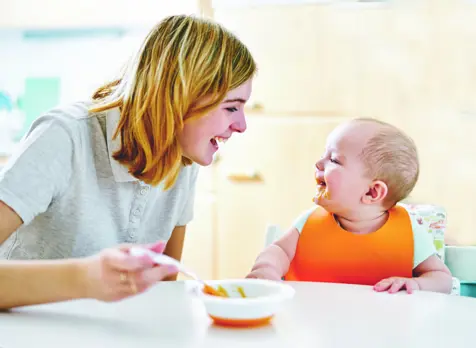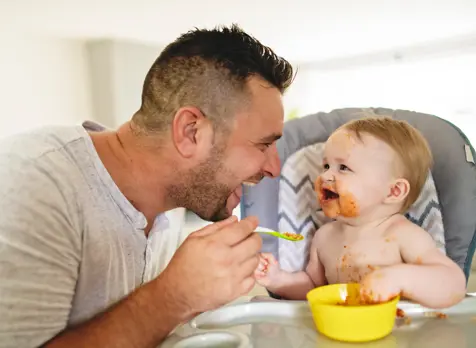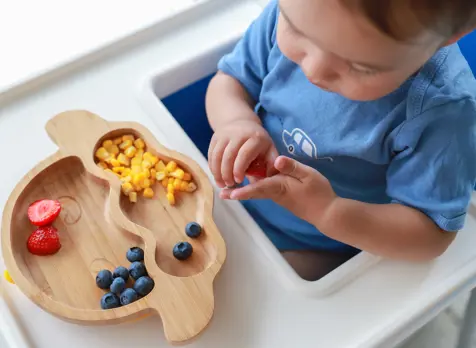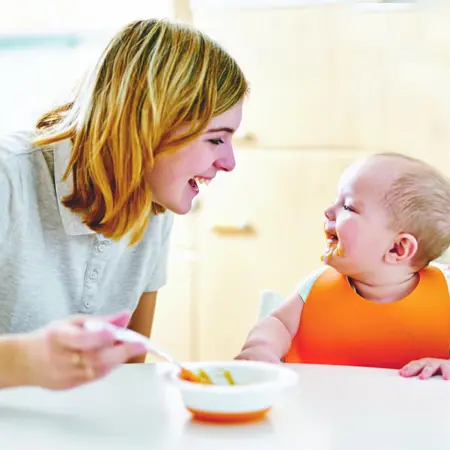Baby Food Ideas And Recipes
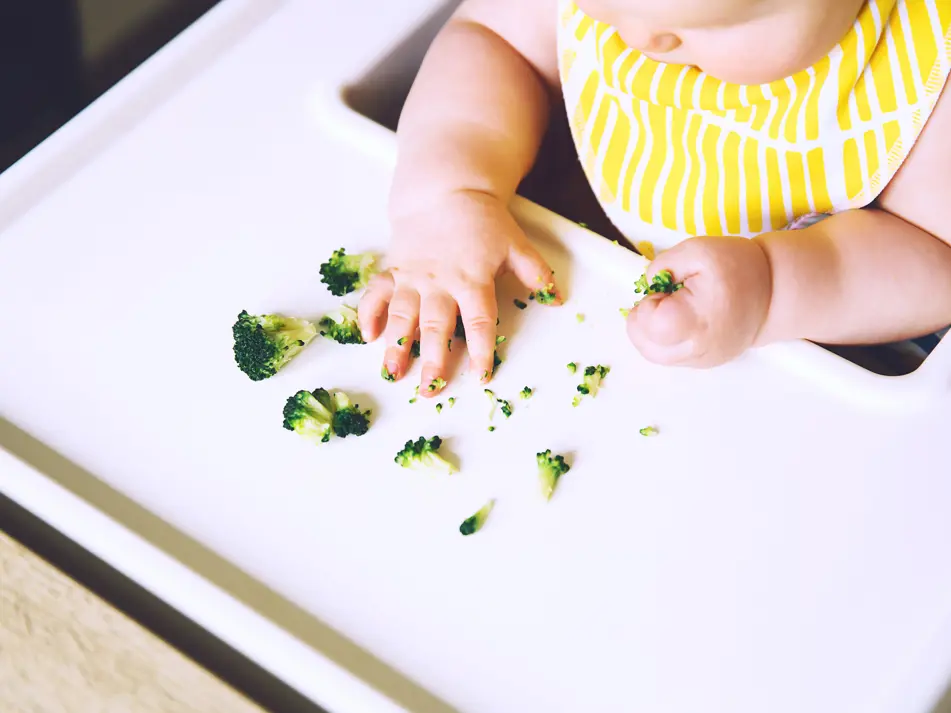
Want to know about starting your baby on solids? Here Tresillian offers tips and advice on signs to look for that baby is ready for solids; whether to chop, mash or puree and what to do if your toddler is a fussy eater.
When do babies start eating solids?
At around the age of 6 months, infants are physiologically and developmentally ready for new foods, textures and modes of feeding, and they need more nutrients than can be provided by breastmilk or formula alone. First foods might be smooth, mashed or in soft pieces, and over time your baby will progress on to minced foods and then chopped foods. You can introduce solids in any order, as long as you include iron-rich foods and a variety of food textures. This helps him learn how to chew, and chewing helps with your baby’s speech development.
Food Texture
Start by offering a smooth puree consistency, introducing one food at a time, until they are eating a variety of foods from all the food groups. As your baby masters the pureed foods, gradually increase the texture and consistency from fine to coarse, mashed, then minced, and then chopped by the time they reach 12 month old baby food. This increase in texture and consistency may take many months to move through the stages.
By eight months, eye-hand coordination is well developed and most babies can manage and enjoy soft textured finger foods. At this stage, they will enjoy having food from your plate.
|
Puree |
Mashed and Minced | Chopped |
| 6 month baby food | 8 month baby food |
NOTE: Never force your baby to take food. Offering solid food is about educating your baby and helping them develop the necessary chewing and swallowing skills.
Sources for iron rich foods
Babies need iron rich and nutrient dense foods – in other words, a balanced diet. This is a wonderful opportunity to check your own diet to ensure the whole family is eating a very healthy diet. Very quickly your baby will be demanding and eating the same food you are eating.
Over the past decade the sequence, variety and type of foods to introduce babies to solid food have significantly changed, becoming far more flexible. This reflects a greater understanding of cultural variations when introducing infants to solid foods.
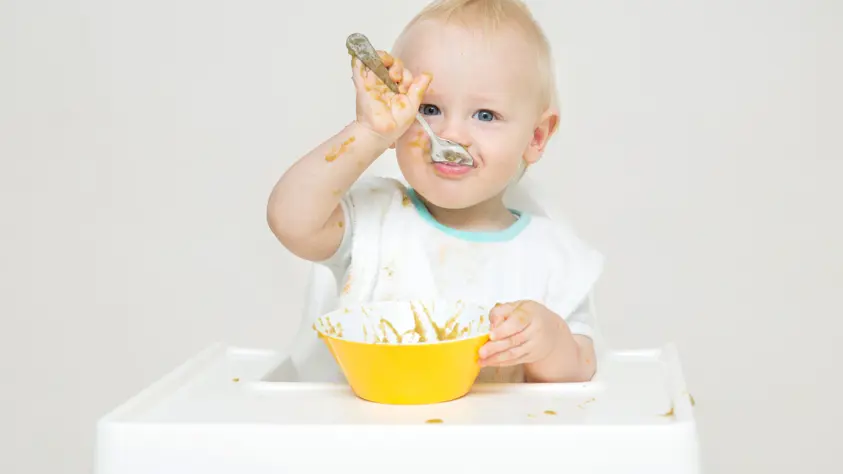
Recipes
Start by offering your baby a smooth puree consistency, introducing one food at a time, until they are eating a variety of foods from all the food groups. It is important to watch for any reactions to the foods.
As your baby masters pureed foods, gradually increase the texture and consistency from fine to lumpy (coarse), mashed, then minced, and then chopped by 12 months. This increase in texture and consistency may take many months.
By eight to 12 months babies should be starting to eat a ‘baby adapted version’ of the main family meal. At the end of this section there are several recipes that the whole family may enjoy.
GUIDE TO CONSISTENCY
|
Remember to always supervise your baby while they are eating to keep them safe.
The following recipes will provide you with some ideas as to the types and consistency of foods you can offer your baby. Many of the recipes will provide more food than your baby will eat, so freeze for another day.
Baby Banana Smoothie
This healthy fruit snack provides your baby with the nutrients of potassium and iron.
INGREDIENTS
- ½ banana
- 1–2 tablespoons of breastmilk or infant formula
- 1 teaspoon of iron enriched baby rice cereal (or for older infants cooked rice)
METHOD
- Peel the banana.
- Place it into a blender with the breastmilk or infant formula until the food resembles a puree consistency.
- Add a teaspoon of rice cereal and mix thoroughly.
Broccoli and Carrot Mash
INGREDIENTS
- 1 head of broccoli (with stalk removed)
- 1 carrot
- ½ potato peeled (use either Desiree or ‘old’ potatoes)
- Sprinkling of grated cheese (optional)
- ¼ cup boiled water or breastmilk
METHOD
- Wash all vegetables thoroughly.
- Peel the potato and carrot and chop off the ends.
- Steam the vegetables until fully cooked and place in the blender with about ¼ cup of boiled water or breastmilk.
- Blend to a puree.
- You can add a sprinkling of grated tasty cheese to vary this dish.
Mini Beef Stew
INGREDIENTS
- 200g diced lean beef (either mince or rump, fish, veal, pork or chicken can replace the beef, or the meat can be replaced by additional vegetables)
- 1 small portion of cooked pumpkin
- ½ zucchini cooked
- ½ potato peeled (use either Desiree or ‘old’ potatoes)
METHOD
- Wash all vegetables thoroughly.
- Cook the beef in a frypan in ½ teaspoon of olive oil.
- Peel pumpkin and chop the ends off the zucchini.
- Steam the vegetables until fully cooked and place in the blender with about ¼ cup of boiled water.
- Place cooked meat with vegetables and boiled water into the blender.
- Blend to a puree.
Mini Lamb Curry
INGREDIENTS
- 200g diced lean lamb (i.e. either mince or backstrap: fish, beef, veal, pork or chicken can replace the lamb)
- ¼ peeled onion
- ¼ cup diced beans (ends removed)
- ½ peeled and diced potato (use either Desiree or ‘old’ potatoes)
- ¼ tin tomatoes
- dash of garlic
- pinch of ground cumin
- pinch of fresh coriander
METHOD
- Wash all vegetables thoroughly.
- Cook the garlic, cumin and coriander with the onion in a frypan in ½ teaspoon of olive oil.
- Add the finely chopped lamb to the frypan and cook till just done.
- Add beans, diced potato and tomato to the frypan
- Cook till just soft.
- Mash rather than puree.
Avocado Mash
INGREDIENTS
- Squeeze garlic
- ½ avocado
- 1 small banana
- 1 tablespoon natural yoghurt
- 2 teaspoons rice bran
METHOD
- Peel the banana and scoop out flesh from avocado.
- Mix all ingredients together to form a mash.
Veggie Surprise
INGREDIENTS
- ½ cup chopped yellow squash
- 1 tablespoon cooked peas (or beans)
- 2 tablespoons tinned tomatoes
- sprinkle of dried parsley
- ½ peeled and cooked sweet potato
METHOD
- Wash all vegetables thoroughly.
- Steam the vegetables until fully cooked.
- Add peas, tomatoes and finely chopped sweet potato.
- Let simmer till soft.
- Add a sprinkle of dried parsley.
- Mash with a fork.
Chicken with Quinoa
INGREDIENTS
- ½ cup diced chicken (beef, veal, pork or lamb can replace the chicken, or you can replace the meat with tofu, legumes or more vegetables)
- ¼ onion, peeled, diced and cooked
- squeeze of garlic
- ½ cup zucchini
- 2 tablespoons tinned tomatoes
- fresh basil or mint finely chopped
- ½ cup quinoa
METHOD
- Cook onion and chicken in the frypan in ½ teaspoon olive oil
- Add zucchini and tomatoes to chicken mixture.
- Run heat to low and simmer for 10 minutes.
- Using a sieve, rinse quinoa in water. Simmer in 1½ cups of water until the quinoa is the same consistency as rice.
- Mix all ingredients with finely chopped basil or mint.
Baby Macaroni
INGREDIENTS
- 500g lean beef mince (lamb, pork or chicken can replace the beef,
or you can replace the meat with more vegetables or legumes) - ½ red onion
- squeeze garlic
- ½ cup grated zucchini
- ½ cup grated carrot
- 2 tablespoons tomato paste
- fresh parsley
- 1 cup beef stock (if using stock cubes make sure they are salt free
or reduced salt) - 1 cup macaroni
- dash Worcestershire sauce
- grated cheese
METHOD
- Cook onion in ½ teaspoon olive oil in frypan.
- Add lean mince and cook.
- Add vegetables and parsley to pan.
- Add tomato paste.
- Let simmer till soft.
- Add beef stock.
- In a separate saucepan, cook macaroni in 2 cups water.
- Once macaroni is soft, strain through.
- Serve with grated cheese.
Fish Dish
INGREDIENTS
- 250g white boneless, skinless fish or salmon
- ½ onion
- ½ cup finely chopped celery
- ½ cup grated carrot
- 10g butter
- 1 teaspoon flour
- ½ cup milk
- 1 teaspoon fresh parsley
- 1 potato (cooked in boiling water and mashed)
- (In a separate saucepan, make a white sauce by melting the butter and then adding flour. Whisk in milk and add grated cheese.)
METHOD
- Cook onion in ½ teaspoon olive oil in frypan.
- Add fish and cook.
- Add vegetables and parsley to pan.
- Let simmer till soft.
- Cook white sauce in separate saucepan.
- Cook potato in boiling water then mash.
- Serve fish and vegetables on mash with white sauce over.






































